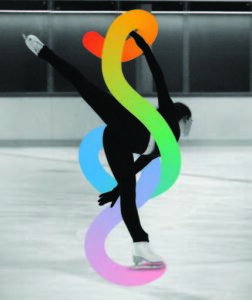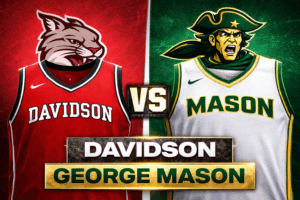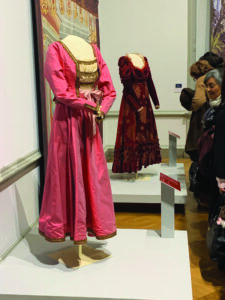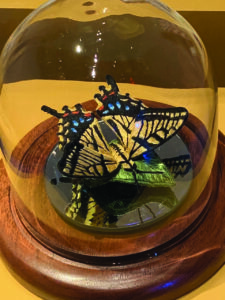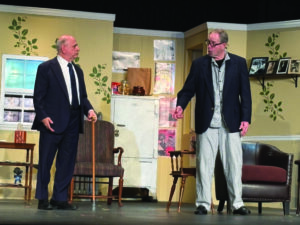
Ben Jaffe, the 44-year-old creative director of Preservation Hall and tubist/bassist for its jazz band’s touring group, readily admits that New Orleans has changed a lot in the almost 10 years since Hurricane Katrina.
And that’s one of the things that makes Preservation Hall, with its mission to “protect, preserve and perpetuate” traditional New Orleans jazz, a vital institution. Jaffe, who grew up in the French Quarter where his parents started Preservation Hall in 1961, knows this.
“We’re one of the most important voices in our city,” Jaffe said. “We’re sort of like a moral barometer for people. If people wonder [about] what the heck they’re doing, all they have to do is look to Preservation Hall for answers. Just ask yourself what would Preservation Hall do in this situation? That’s how I feel about it.”
And what did the Preservation Hall Jazz Band do when the Hall, a building only assuming in its humility and maturity, had to close down for several months following Hurricane Katrina? They kept on touring, spreading the sounds created by Jelly Roll Morton, King Oliver and Buddy Bolden.
Eventually, the Hall opened back up and the Preservation Hall Jazz Band, the touring group and the revolving door group of musicians called the All-Stars who play nightly shows at the Hall, resumed their rigorous performing schedule of over 250 shows a year. But the impact of Katrina, Jaffe said, caused him to examine the wreckage and relics of his city.
The results of this churning was That’s It, the Preservation Hall Jazz Band’s first album made up entirely of originals, released in 2013 on Sony Legacy. Like most of the great new jazz of today, it’s at once modern and traditional, remixing relevance into the sounds of the past.
“Hurricane Katrina got me thinking about our past,” Jaffe said. “It got me thinking about our history and what we represented. And we’d done just about everything we could to document our history. We’ve recorded just about every song, we’ve performed in all the traditional styles, so there was really nothing left for us to do. Really, what’s left for us to do is create the next tradition.
“And so I was looking back 100 years to Jelly Roll Morton, King Oliver and Louis Armstrong and figuring out what the heck they were doing. They were writing new songs, I mean shucks, when those guys came along people hadn’t heard jazz before. They were creating jazz. So, that’s part of it. The Hall’s been carrying on tradition and that’s always going to be a part of what we do….[But] we also have a responsibility and obligation to make sure that the music that we create moving forward continues to be relevant to our city and our condition.”

Jaffe said that he, Preservation Hall, and the Preservation Hall Jazz Band are on a mission. “Preservation Hall has lots of purpose. One of the things that’s central to what we do is we are all part of family legacies or dynasties that date back to the earliest days of New Orleans jazz, and it’s something that we all take very personally. These traditions that we grew up with in New Orleans,” Jaffe said.
“And protecting the communities that provide this incredible music. It didn’t come out of the air. We didn’t learn this from a book. We were taught this by our elders.”
In Jaffe’s case, that meant he learned New Orleans jazz from his father, Allan Jaffe, and the myriad of musicians who made up the Preservation Jazz Hall Band when he was a kid. For example, Jaffe learned upright bass from bassist/sousaphonist Walter Payton, Jr., who was once a member of the Preservation Hall Jazz Band, at New Orleans Center for Creative Arts.
But long before Jaffe was born, in 1961, the institution created by Allan and Sandra Jaffe had a mission that was bigger than music, though music was at its center.
“Preservation Hall also dealt with all these social and racial issues that, in 1961, the arts were just trying to find a way to be a part of,” Jaffe said. “There was a lot going on. It was a serious time.”
The way that Jaffe’s parents and the Hall dealt with one of the biggest racial issues of the time, segregation, was to allow integration in Preservation Hall from its inception. The two even had to spend nights in jail and night court because of their choice to allow integration in the venue.
“They just said that we aren’t going to obey this law and we’re just going to be an open venue,” Jaffe said. “Its kind of remarkable that they managed to do it…they received so much attention so quickly for what they were doing that they were actually embraced by the city instead of the city trying to come and shut them down.”
He said that the music was the great uniting factor, and even a shield, for those daring to enjoy it without regard to the racial laws of the time. “You couldn’t find anything wrong with it at the end of the day,” Jaffe said.
“Even to this day. I know that we’re here preserving the tradition and being part of a community but what we’re doing is saying ‘This music is the gateway to peace and love and understanding.’ There’s something about this music that is bond. If you can get with this music, then you can get with life and if you can get with life then we don’t have to put up with all this other bullsh*t that we’re dealing with in the world.”
Jaffe listed police brutality of black people, the attack by White supremacist Dylann Roof on the predominantly black Emanuel A.M.E. in June that left nine dead and the flying of Confederate flags as signs that society is still dealing with some of the same issues that his parents’ generation dealt with.
“We just recently traveled to a state and, as we were leaving the venue, a truck drove by with a Confederate flag and an American flag hanging off the back,” Jaffe said. “Now, I won’t mix any words about this: The Confederate flag is a symbol of hatred to an African-American. It’s a symbol of hatred. It’s a symbol of White supremacy. I don’t buy the argument that it’s about one’s heritage. There are other ways to celebrate one’s heritage without being offensive. It’s mind-numbing to me….to me that’s terrorism. That’s hatred. To me that’s no different than someone waving a Nazi flag in my face.”
But, music, Jaffe said, is one of the ways to achieve social justice. “It’s unbelievable what you can achieve [with music]….I’ve seen it move people,” Jaffe said. “I’ve seen our music move people to tears and I’ve seen our music move people to joy…and I know it to be true, because it’s done it my whole life. That’s the life I want to live – I want to live a life full of joy and happiness. There’s enough things we’re going to have to struggle with in life. We need art and we need music and we need New Orleans to make the world appreciate the beauty of the planet.”
Preservation Hall Jazz Band will be on mission, playing the music of their elders and the music of now, including new material they’ve been working on, at The Birchmere on Thursday, Aug. 13.
• For more information about Preservation Hall Jazz Band, visit preservationhall.com.


